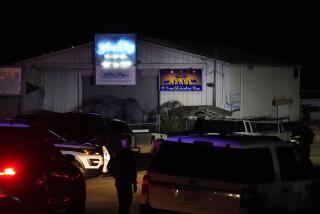Workers get new help in Dole fight
- Share via
Six Nicaraguan men who won a multimillion-dollar verdict in a 2007 jury trial against Dole Food Co. and other U.S. corporations are entitled to the money despite a Los Angeles judge’s ruling that cast doubt on the merits of their case, the men’s attorney wrote in papers filed Thursday.
The attorney, Oakland-based Steve Condie, stepped into the fray this week, months after all other attorneys for the Nicaraguans quit the case, leaving the plaintiffs without a lawyer. Condie argued that the men were denied rights and due process because of highly unusual and secretive proceedings held by the judge.
The 2007 case, Tellez vs. Dole Food Co., was the first case to be tried in a U.S. court brought by Nicaraguan men claiming to have been rendered sterile by the pesticide DBCP on Dole-operated banana farms. Attorneys heralded the $3.2-million verdict as a victory and a test case for thousands of other men who have filed cases against Dole and Dow Chemical Co. in Nicaragua. The verdict was later reduced to $1.58 million by the judge.
Earlier this year, L.A. County Superior Court Judge Victoria Chaney called the verdict into question when she dismissed two separate cases against Dole and other corporations and detailed what she said was an extensive conspiracy by attorneys to bring fraudulent claims. Relying on secret testimony and sealed evidence gathered by Dole, Chaney said the fraud made it impossible to discern legitimate claims from fake ones.
“The court believed something was awry with the testimony of many of the witnesses in Tellez, but was unable to pinpoint the cause,” she wrote. “It is now clear that those plaintiffs and the evidence presented were all a product of the fraudulent enterprise.”
In May, attorneys for Dole asked an appellate court to overturn the verdict based on Chaney’s ruling. The 2nd District Court of Appeals sent the case back to L.A. County Superior Court and ordered the plaintiffs to show that their case was not based on fraud.
Condie, in his filing, criticized the closed proceedings in which Dole presented testimony and statements from 27 “John Doe” witnesses.
Because Dole convinced Chaney that they would be in danger in Nicaragua, the names of those witnesses were kept secret from the public and from a key attorney for the plaintiffs.
That attorney, Juan Dominguez, was named by Chaney as a central figure in the fraud.
Some plaintiffs attorneys were allowed to participate in the depositions of witnesses, but the judge ordered those attorneys not to investigate them.
Condie, who said he was retained last week, called the process “flawed” and said it became “inquisitorial” because it relied entirely on evidence presented by one side.
Even if Dole proved there were thousands of fraudulent claims in Nicaragua, Condie argued, that would not discredit the claims of the men who were tested by American doctors and found by a jury to have been rendered sterile by the pesticide.
Theodore Boutrous Jr., an attorney for Dole, called Condie’s papers baseless and full of inaccuracies. Chaney’s conclusions regarding fabricated work certificates and coaching of witnesses discredits the evidence and testimony that the jury considered during the trial, he said.
“Now we have a lawyer who has not seen the evidence making all these sweeping and false statements without any basis for doing so,” Boutrous said.
Although most of the evidence of fraud that Chaney relied on remains out of public view, the identity of one of the secret witnesses is known.
Irving Jacinto Castro Aguero, 60, who headed crews that applied the pesticide on several farms during the 1970s, said in a July interview with The Times that he is one of the John Does.
He said Dole investigators paid him $200, about a month’s salary, to give a deposition but that the money did not affect his statements. When Dole lawyers read him the names of several men claiming to have worked on his crews, he did not recognize them, he said.
Castro, who is not sterile but joined a suit in Nicaragua claiming that DBCP caused other health problems, said he agreed to testify for Dole to help separate the impostors from legitimate victims.
--
More to Read
Sign up for Essential California
The most important California stories and recommendations in your inbox every morning.
You may occasionally receive promotional content from the Los Angeles Times.












